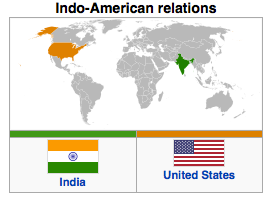Antony And Panetta: A Shakespearean Drama? – Analysis
By IPCS
By PR Chari
Why did US Defense Secretary, Leon Panetta, hurry to New Delhi immediately after he met Antony in the 11th Shangri-la dialogue in Singapore that ended on 3 June? A parallel can be found in Shakespeare’s drama Antony and Cleopatra. Romance apart, both were together seeking the leadership of the Roman Empire, which was ultimately established by Augustus (Octavian) after he defeated the two lovers in the naval battle of Actium (31 BC) to gain world dominance.
Was Panetta’s visit designed to pursue defense cooperation? It comprises several aspects, including arms sales, technology transfers, licenses and co-production of weapon systems, military exercises, evolving new doctrines, and service-to-service acquaintance. Rarely does the backdrop to defense cooperation viz. seeking greater congruence in identifying threats to national security excite public interest. Such issues are usually discussed in high security one-on-one meetings between leaders, who also reach agreement on how little the media should be informed.

For the record, Panetta had informed the New Delhi elite that defense cooperation with India is the lynchpin of America’s new strategy to expand its presence and military partnerships from the Western Pacific and East Asia into the Indian Ocean region and South Asia. Panetta stressed the similarities between American and Indian strategic interests like ensuring open access to the global commons in the oceans, air, space and cyberspace domains. The defense relationship, he maintained, must proceed beyond its present ‘buyer-seller’ format to include ‘co-production’ and ‘high technology joint research and development’. All this was music to the ears of the Indian defense establishment.
Antony was circumspect, and spoke of strengthening the multilateral security architecture in the Asia-Pacific region, but at a pace acceptable to the countries affected. While endorsing the Grotius principle deifying the freedom of the seas for peaceful navigation, Antony added that bilateral disputes should be settled by the countries concerned. In essence, Panetta’s ardour in ‘pushing the envelope’ was countered by Antony’s lack of enthusiasm.
Panetta had explained the rationale underlying the US ‘rebalancing’ towards Asia in his address to the Shangri-la conference. (‘Rebalancing’ is the new term of art which has replaced ‘pivot’.) It would entail a re-deployment of US naval assets between the Pacific and Atlantic Oceans: the present 50:50 distribution would be altered to a 60:40 mix, emphasizing the strategic importance of the Asian rimland. Incidentally, the Indian Ocean and South Asia form part of the responsibilities assigned to the Pacific Command. Panetta denied that this alteration in American strategic posture had anything to do with China, but drew attention to the South China Sea disputes, where China’s is claiming exclusive rights over these waters, which is being opposed by all the littoral countries.
Significantly, China’s Defense Minister, Liang Guanglie, did not come for the Shangri-la meeting. The consensus of opinion was that he avoided this conference, lest he might be asked to explain Beijing’s intransigent South China Sea policy He could also have been questioned on China’s aggressive arms acquisitions of anti-access and area denial weapons premised on anti-ship missiles and cyber warfare. Clearly, China’s strategic posture is directed against the US. For its part, the US has founded its ‘rebalancing’ posture on a new Air-Sea Battle strategy, which entails the deployment of long-range conventionally-armed missiles and counter-cyber-warfare capabilities. The significance of these developments in the United States is that they are being pursued by the Pentagon despite the financial crunch and pressures on the defense budget.
Naturally, Antony wishes that Indo-US defense cooperation will proceed on India’s terms and at its own pace. Unfortunately, hedging ones’ bets forever cannot work indefinitely. Decisions are often forced on nations when they are lest prepared. Apropos, a massive blow to India’s prestige in Southeast Asia has been inflicted by its pusillanimous withdrawal from exploring two oil blocks leased from Vietnam. The ostensible reason was that these oil blocks have no oil, but the impression left is that this withdrawal only reflects India’s anxiety not to offend Beijing. A high-powered committee could always have been formed to consider the matter in depth and defer a final decision!
The high point in Indo-US relations was reached in 2008 with the conclusion of their nuclear deal. It has still to be implemented, and there is no guarantee that this will be possible. Meanwhile, the US withdrawal from Afghanistan in 2014 and the perceptible ‘descent into chaos’ occurring within Pakistan, alongside water issues gaining traction in several of its neighbours suggests that South Asia is entering into increasingly turbulent times. Will China aggravate or help to manage the region? Will the US remain involved or retreat from it? Answers to these questions will inform the limits to an Indian foreign policy based on hedging and procrastination, deriving from timidity.
This is the major lesson to be drawn from the Antony and Panetta interaction.
PR Chari
Visiting Professor, IPCS
email: [email protected]

Antony is a failure as a defense minister. He has mismanaged defense production, procurement and research. His claim to fame is that he is not corrupt. The governments policies are questionable, it is weak and indecisive. One should expect little from this weak and indecisive government.